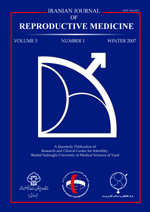
|
International Journal of Reproductive BioMedicine
Research and Clinical Center for Infertility, Shahid Sadoughi University of Medical Sciences of Yazd
ISSN: 1680-6433
EISSN: 1680-6433
Vol. 11, No. 1, 2013, pp. 19-24
|
 Bioline Code: rm13003
Bioline Code: rm13003
Full paper language: English
Document type: Research Article
Document available free of charge
|
|
|
International Journal of Reproductive BioMedicine, Vol. 11, No. 1, 2013, pp. 19-24
| en |
Analysis of MLH3 C2531T polymorphism in Iranian women with unexplained infertility
Pashaiefar, Hossein; Sheikhha, Mohammad Hasan; Kalantar, Seyyed Mehdi; Jahaninejad, Tahereh; Zaimy, Mohammad Ali & Ghasemi, Nasrin
Abstract
Background: Meiotic genes are very important candidates for genes contributing to female and male infertility. Mammalian MutL homologues have dual roles in DNA mismatch repair (MMR) after replication errors and meiotic reciprocal recombination. The MutL homologs, MLH1 and MLH3, are crucial for meiotic reciprocal recombination and human fertility. In this study the functional polymorphisms of MLH3 C2531T was investigated in Iranian women with unexplained infertility.
Objective: Investigating the association between a common SNP (single nucleotide polymorphism) C2531T in the MLH3 gene and female infertility.
Materials and Methods: In total, 105 women with unexplained infertility as case group and 100 women with at least one child and no history of infertility or abortion as controls were recruited for this association study. The MLH3 C2531T polymorphism was tested by tetra-amplification refractory mutation system-PCR (4P-ARMS-PCR) method.
Results: The MLH3 2531C and T alleles frequencies were 43.33% and 56.67% among infertile patients, and 61.5% and 38.5% among normal controls, respectively. In the patient and control subjects the CC (Pro 844 Pro) genotype frequency of MLH3 C2531T was 4.76% and 25%, the CT (Pro 844 Leu) genotype was 77.15% and 73%, and the TT (Leu 844 Leu) genotype was 19% and 2%, respectively (p=0.0001).
Conclusion: The presence of the polymorphic allele T leads to an increased risk of 2.09 times (OR=2.09, 95% CI=1.38-3.16; p=0.0001) for developing infertility in relation to the control group. Therefore, our data suggest that the MLH3 C2531T polymorphism can be associated with the risk of unexplained infertility in Iranian women.
Keywords
Female infertility, Mismatch repair genes, MLH3, Polymorphism
|
| |
© Copyright 2013 - Iranian Journal of Reproductive Medicine
Alternative site location: http://www.ijrm.ir
|
|
